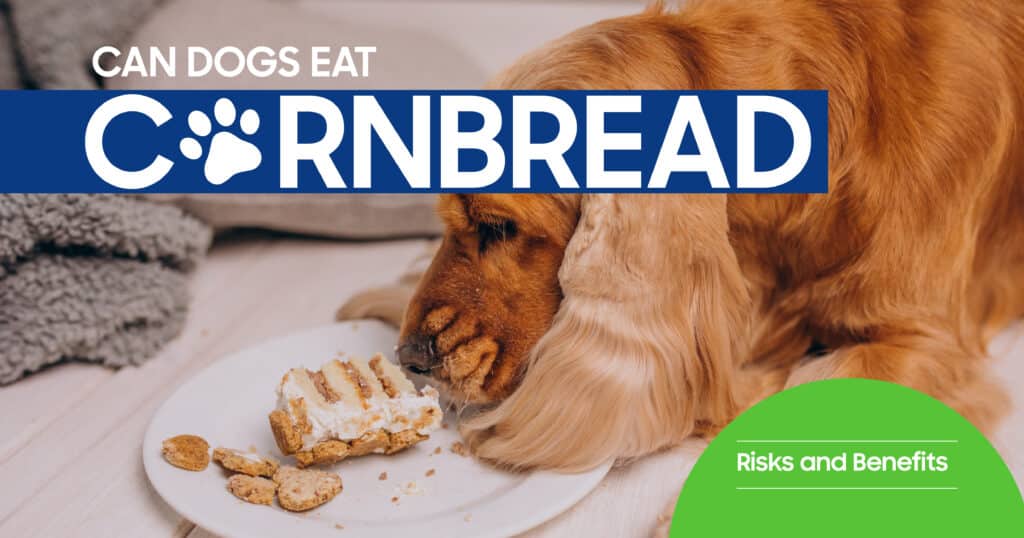Along with comforting meals, cornbread is a staple in many homes. Your dog is likely sitting beside you, thoroughly excited to eat a piece of the warm cornbread. But the question remains: Can Dogs Eat Cornbread? Or is it better left unattended on the table?
Cornbread can be served to dogs in certain instances, but some recipes can be problematic. Granulated sugar, other recipe dependents, and cornbread problems can be troublesome.
We will assess the pros and cons of cornbread for dogs and its nutritional constituents. By the end, you will have better insight into whether dogs eating cornbread can be appropriate while also coming up with more suitable alternatives.
Is Cornbread Safe for Dogs? Key Considerations
Cornbread consists of cornmeal, flour, butter, sugar, eggs, and milk. Alone, these ingredients may seem simple, but when blended, they form a recipe that can prove harmful to dogs in large amounts. Is cornbread safe for dogs? It is, but the answer changes based on situational factors like the components of the cornbread, portion size, and the frequency of consumption.
Nutritional Value of Cornbread for Dogs
Cornbread is comprised of carbs, some fiber, and protein from eggs and milk. Corn is often found in commercial dog food because it is a good energy source and fiber. However, the way humans make cornbread is less helpful for dogs.
Most store-bought cornbreads contain unhealthy preservatives, sugar, and oils which dogs do not require. Although homemade cornbread has no harmful ingredients, it is still high in carbs and low in nutritional value compared to other dog-lover foods.
The Risks of Feeding Cornbread to Dogs
A pet owner’s concern with a dog eating cornbread is the amount of carbohydrates the dog will ingest. Dogs tend to eat more protein, and consuming cornbread will result in overfeeding, which leads to obesity and bloating.
Sugar, butter, and milk can easily irritate the stomachs of lactose-intolerant dogs. Numerous prepackaged blends have xylitol or some other unhealthy sweetening compounds.
When Cornbread Could Be Harmful to Your Dog
Although cornbread should not harm a dog if given in moderation, there are times when it should be avoided altogether. Such cases include diabetes, obesity, and specific food intolerances, which can be problematic when eating cornbread.
To make matters worse, some recipes call for adding garlic and onion, which harm dogs. Even dogs considered to have the most mildly sensitive stomach issues may have some little pieces of cornbread trigger vomiting or diarrhea.
Potential Health Benefits of Cornbread for Dogs
Cornbread isn’t the healthiest thing to give, but it does have some small benefits if provided in moderation.
Can Cornbread Provide Nutrients for Dogs?
In the case of cornbread, cornmeal, much like the other constituents, has scant amounts of vitamins, minerals, and some fibers that contribute to the nutrition of a single serving poorly and, therefore, holds no significant value when added to a dog’s diet. In addition, while milk and eggs contain protein and calcium, those nutrients are more accessible and helpful when acquired from another source.
The Role of Corn in Dog Diets
Despite being one of the most utilized ingredients, corn is not that valuable. It is included in dog food in a more handy amount, though dogs might develop an allergy to it, which can result in skin or digestive issues. As a result, allergy-sensitive dogs shouldn’t be given corn snacks.
Cornbread as an Occasional Treat
Should your pup enjoy cornbread? A small, plain piece should not be an issue occasionally. The catch is that moderation cornbread must not be used instead of nutritionally balanced dog food or wholesome snacks.
If you wish for your pup to try some, make it at home. It does not contain risky ingredients like sugar, butter, or sugar substitutes.
Common Ingredients in Cornbread and Their Impact on Dogs
Every cornbread recipe is unique. Some recipes, however, contain ingredients that can be harmful to dogs.
Can Dogs Eat Cornbread With Butter?
If your pup relishes cornbread, sharing it occasionally is reasonable. You may offer some to your furry friend, but make sure no sugar, butter, or other sweeteners are added, and serve it fresh.
The Effect of Sugar in Cornbread on Dogs
Can dogs safely eat cornbread that is sweetened with sugar? That is complicated. A dog wouldn’t mind a sprinkle of natural sugar, but most cornbread recipes call for much more than a dog can handle.
In the long run, excessive amounts of sugar can result in obesity, diabetes, and adverse dental health. Commercially sold sweetened cornbread has added sugar, making it the most unhealthy dog option.
What About Cornbread With Milk or Eggs?
Cornbread paired with milk and eggs can be a nice treat to add to your dog’s diet, but those parts are also challenging to break down. Milk-based cornbread may cause tummy troubles for a lot of lactose-intolerant dogs.
Conversely, eggs are a healthy ingredient but must be included in moderation. If you wish to give your dog cornbread, lactose-free versions are better.
Risks of Cornbread With Raisins or Other Additives
Some cornbread recipes have dangerous ingredients, like raisins, which are poisonous to dogs. Even the slightest amount can result in renal failure. An artificial sweetener, xylitol, is also severely harmful to dogs. When giving your pets human food, checking the ingredient labels closely is best.
What Happens If Your Dog Eats Too Much Cornbread?
If a dog eats a fraction of a cornbread slice, there are expected to be no negative repercussions. But too much may cause a range of problems.
Digestive Issues and Stomach Discomfort
Excessive intake of cornbread may result in swelling, flatulence, and even defecation problems for sensitive dogs. Constantly monitor your dog’s behavior after giving it water as a hydrating agent, mainly if he displays these symptoms.
Risks of Overfeeding Dogs with High-Carb Foods
Animals shouldn’t regularly consume cornbread. Its excessive carbohydrate content can lead to obesity, low activity levels, and, in the long term, diabetes.
The Importance of Moderation in Treating Dogs
Care must be taken when feeding a dog human food. Moderation is important because while treats are essential, they should not form the bulk of a dog’s diet. Likewise, cornbread should not become a daily snack. A veterinarian will always give the most accurate answers concerning any new food to the dog, should there be any doubts.
Healthy Alternatives to Cornbread for Dogs
The options are endless when choosing a healthy replacement for cornbread for dogs.
Dog-Safe Baking Options and Recipes
For a cornbread alternative, consider making a dog-friendly recipe by adding whole wheat flour, unsweetened applesauce, and pumpkin pure. This will give the dog fantastic nutrition without worrying about digestion issues.
Healthy Dog Treats and How to Make Them at Home
Sweet potatoes, carrots, and oats, both nutritious and delicious, can be used as clean fillers to handle your puppy’s snacking needs.
What Foods Are Safe for Dogs?
Some people and their dogs enjoy the company of certain safe vegetables, such as apples, blueberries, and lean meats. Knowing what is safe for a dog goes a long way in helping them choose safe dog treats.
Should You Feed Your Dog Cornbread?
While cornbread isn’t harmful to dogs, it is not ideal. Because of its carbs and some unwanted content, cornbread is best eaten sparingly. Try essential homemade dog snacks for a healthier alternative. When making changes to your dog’s diet, speak to a vet.
FAQs
Can dogs eat cornbread every day?
While cornbread poses no threat to dogs, it does have an excessive amount of sugar and butter. For that reason, it should not be consumed daily. From my experience, dogs have never really understood cornbread, and perhaps that’s a blessing in disguise. However, the most they may need to worry about is diabetes and a few other serious health problems.
What should I do if my dog eats a large amount of cornbread?
If your dog eats a lot of cornbread, watch for potential vomiting, diarrhea, or bloating. If the cornbread has large amounts of cornbread, xylitol raisins, butter, or any combination, consult your veterinarian immediately.
Are there any dog-friendly alternatives to cornbread?
Dogs can eat many different foods in place of cornbread. Whole wheat flour, unsweetened applesauce, oats, and pumpkin can all create dog treats. The dog’s digestive system will be far less offended by these ingredients, resulting in better health.
Can dogs be allergic to cornbread?
Cornbread is a well-known dog allergen. Its main ingredient is corn, and symptoms include inflammation of the skin, issues with digestion, ear infections, and itching. If you think your dog might have a corn allergy, you should stop feeding it cornbread and contact a vet immediately.
Is homemade cornbread safer for dogs than store-bought?
Usually, homemade cornbread is healthier for dogs than store-bought ones because you can monitor what goes into it. One that is simple for dogs to eat would have no sugar, butter, or butter substitute. That being said, cornbread should be a treat occasionally and not something that makes up a large part of your dog’s diet.



